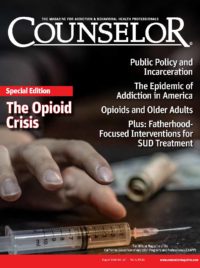In a previous posting to this site I wrote about the basic ways in which addiction treatment specialists and other therapists can fold 12 step principals and themes into therapy. In that article I discussed the belief that clinicians treating addicts should generally steer their clients toward the external social support and guidance offered by …
Read more
Author Archives: Rob Weiss
Incorporating the Principles of 12 Step Recovery into Addiction-Focused Therapy: Step 1
February 9th, 2017 | Posted by in Addiction | Alcohol Addiction | Drug Addiction | Prescription Drug Addiction - (Comments Off on Incorporating the Principles of 12 Step Recovery into Addiction-Focused Therapy: Step 1)Preventing Relapse: Best Practices in Addiction Treatment
January 8th, 2017 | Posted by in Addiction | Addiction & Recovery - (Comments Off on Preventing Relapse: Best Practices in Addiction Treatment)
Back in the 1990s, the National Institute on Alcohol Abuse and Alcoholism (NIAAA) published a monograph intended for use by therapists dealing with alcohol dependent individuals. Essentially, the NIAAA recommended that clinicians steer their alcoholic clients into Alcoholics Anonymous (AA) while simultaneously incorporating the principles of AA’s twelve steps into therapy sessions. The NIAAA’s monograph …
Read more
Holiday Sanity and Sobriety: Tips for Recovering Addicts
December 13th, 2016 | Posted by in Addiction & Recovery | Alcohol Addiction - (Comments Off on Holiday Sanity and Sobriety: Tips for Recovering Addicts)
The holiday season is supposed to be overflowing with joy. Most people, however, find themselves dealing with stress and anxiety more than any of the happier emotions. For recovering addicts in particular, the holidays can be a difficult time of year, as all of the extra emotional discomfort can and often does trigger a desire …
Read more
Which Client is Sexually Addicted?
December 6th, 2016 | Posted by in Addiction | Sex Addiction - (Comments Off on Which Client is Sexually Addicted?)
In today’s world, all sorts of people are misdiagnosed, by self or others, as sexually addicted. This occurs for any number of reasons. Recognizing this, it is imperative that addiction therapists and other clinicians learn to differentiate between those who are and those who are not sexually addicted. Otherwise, we risk over-treating and/or mistreating clients—either …
Read more
Identifying Common Behavioral Addictions
November 16th, 2016 | Posted by in Addiction | Love Addiction | Sex Addiction | Shopping Addiction - (Comments Off on Identifying Common Behavioral Addictions)
I spend a lot of time and effort in this space describing sexual addiction—what it is, how it can be identified, and how it can best be treated. However, sex is not the only behavioral addiction. In fact, just as it is with pleasure-inducing substances, almost any pleasure-inducing behavior can be used in an addictive …
Read more
Research Links Heavy Porn Use and Erectile Dysfunction
October 31st, 2016 | Posted by in Sex Addiction - (Comments Off on Research Links Heavy Porn Use and Erectile Dysfunction)
Psychotherapists dealing with sexual issues, in particular sex and porn addiction, have stated for several years that one of the consequences porn abusing male clients are commonly reporting is sexual dysfunction—most often erectile dysfunction (ED) but also delayed ejaculation (DE) and sometimes even a complete inability to reach orgasm (anorgasmia). Interestingly, many such clients say …
Read more
Can You Really Be Single, Sexless, and Happy?
October 13th, 2016 | Posted by in Relationships | Sexuality - (Comments Off on Can You Really Be Single, Sexless, and Happy?)
Not long ago, in response to a cultural shift I’ve observed in recent years, I coined the term “sologamy,” defining it as the state of being single and not wanting a romantic or sexual relationship. Once upon a time, of course, sologamy was almost unthinkable. Living solo was looked upon as highly undesirable and something …
Read more
Technology and Sexual Addiction
September 27th, 2016 | Posted by in Addiction | Sex Addiction - (Comments Off on Technology and Sexual Addiction)In today’s world, pretty much everyone has a laptop, tablet, and/or smartphone. As such, pretty much everyone has 24/7 access to everything the internet and smartphone apps have to offer—including sex and romance. And because of this, sexual addiction is very much on the rise. For most people, of course, digital sexnology is not an …
Read more
Sex Addicts and Their Underlying Issues
August 23rd, 2016 | Posted by in Addiction | Sex Addiction - (Comments Off on Sex Addicts and Their Underlying Issues)In today’s world, almost every psychotherapeutic clinician encounters at least a few clients who are behaving in sexually compulsive ways. The first step in treating these clients, the same as with any disorder, involves proper assessment. Unfortunately, very few biopsychosocial instruments cover sexual issues in any sort of meaningful way. Thus, I suggest that clinicians …
Read more

